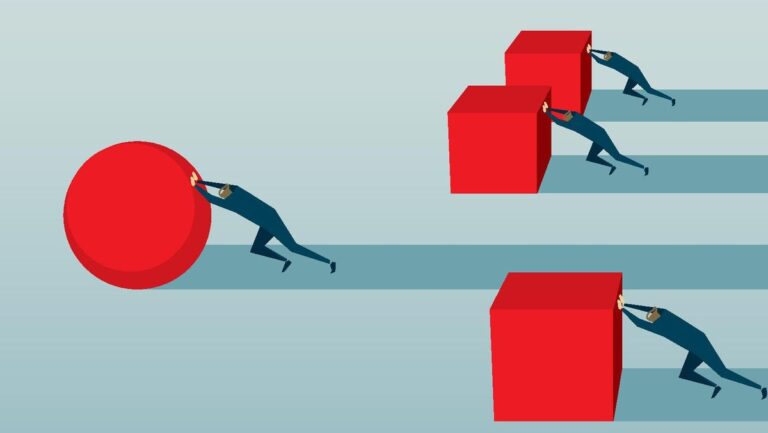
Innovation Strategy
We are edging towards a global recession as most major economies—including the U.S., China and Europe—begin to slow down. According to the IMF, one third of the global economy will slip into recession in 2023. Meanwhile, global inflation hit a record 12.1% in October. The war in Ukraine has upended the fragile economic recovery from the pandemic, triggering higher food and energy prices.
Global inflation has dented consumer purchasing power. In a consumer economy, where household spending is the largest component of gross domestic product (GDP)—purchasing power determines overall economic health. Most companies face a tough road ahead, with profitability squeezed by rising costs and weakening consumer demand. The choices made today will define business outcomes tomorrow. Here are some practical actions marketing leaders can take to emerge from the recession stronger than ever.
Understand the change
The biggest challenge facing companies is knowing where to allocate limited resources. Before making big strategic decisions, companies should conduct research to understand changes in the market. In other words, consumer needs should inform all future business investments. Unless we understand the change – and what remains unchanged – we will end up designing products, services and communications based on assumptions.
Recessions impact companies differently, and not all recessions are the same. Like the pandemic, some categories will experience growth while others face decline. It’s critical to track how consumers rethink priorities, reallocate spending, switch brands and redefine value. Exploratory research will reveal emerging attitudes, challenges and opportunities facing your business. The focus should be on establishing leading indicators, not historical data or past performance. Primary research is often viewed as a business cost, but investing in brand diagnosis reduces waste and increases effectiveness. Now is the time to reassess your product portfolio, marketing objectives, consumer segmentation and brand positioning.
Think long-term and innovate
Brand building is often the first casualty of an economic downturn. Even though more than a hundred years of evidence suggest companies that invest in marketing during a recession outperform competitors in the long run. Maintaining advertising spend while others cut back builds long-term consumer demand. But most companies will have to deal with budget cuts. Therefore, it becomes imperative to streamline operational costs and invest in the future. A study of 4,700 public companies during the last decade reveals the most successful companies reduce costs selectively by focusing more on operational efficiency than rivals while continuing to invest in marketing, R&D and new assets.
Reviewing supply chains, internal processes and resource allocation are a good place to start. For example, large companies could save as much as $100 million a year by holding fewer unnecessary meetings. In addition, AI (artificial intelligence) and automation could save businesses an average of 2,075 hours per year. Just imagine the extra time and resources redirected towards a lean innovation process focused on testing and learning.
From adversity comes new business opportunities. The last global recession enabled the conditions for companies like Uber, Airbnb, WhatsApp and Mailchimp to flourish. Economic downturns can be an excellent opportunity to explore new products, markets and business models. Companies agile enough to respond to changing market conditions will reap the rewards of innovation, unlike organizations burdened with time-consuming approval processes. More than ever, company culture and structure become critical points of difference. Studies show that psychological safety unlocks calculated risk-taking, creative problem-solving and market breakthroughs. Business leaders who actively embrace new ideas, experiments and uncertainty are more likely to deliver long-term growth.
Futureproof the business
Companies hit by rising costs will take steps to reduce expenses and improve efficiency. Many business leaders will be looking to cut non-essential spending. The Ukraine war, double-digit inflation and economic uncertainty have pushed ESG down the agenda. Around 50% of global CEOs are pausing or reconsidering ESG efforts in the next six months. However, brands can’t afford to ignore public demand for climate and social justice. Brands risk being called out for greenwashing if the gap between marketing talk and business action widens. Business leaders must balance short-term economic stability with long-term social and environmental responsibilities.
Economic slowdowns can make companies less optimistic and more inward focused. But reducing carbon emissions, building resilience and adaptation solutions are critical steps in future-proofing your business. Unless we commit to urgent and collective action, there won’t be a planet for business transactions. Equally, business needs to play a leading role in promoting inclusive growth. Unequal access to opportunities stunts economic growth and lowers skills and human capital.
In the 21st century, financial performance will be a direct outcome of social and environmental action. Most companies fail because people aren’t prepared to change their behavior. But in times of crisis, business as usual can be more dangerous than launching into the unknown.